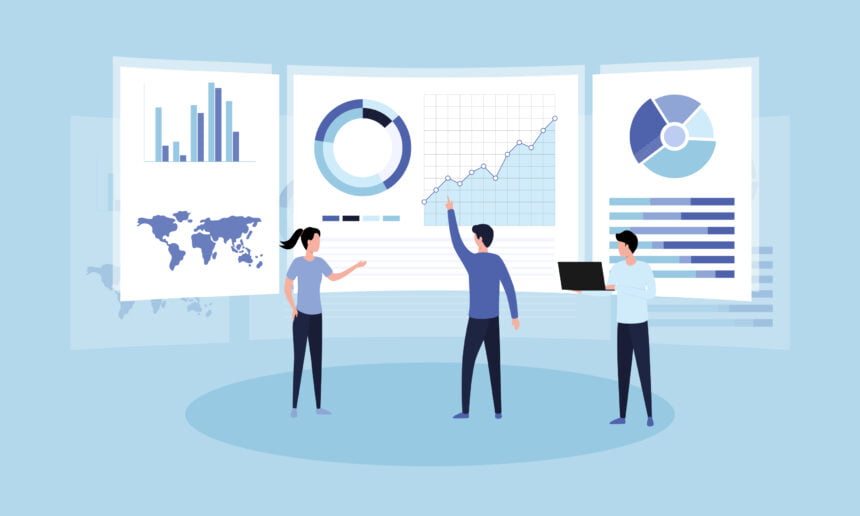Proper marketing and sales prospects play a huge role in improving the success rate of your business. The strategy can either be offline or digital. However, digital marketing has become the major focus of marketers across all industries, mainly due to how customers interact and engage with modern businesses.
Seeing an opportunity and knowing how and when to take advantage of it defines the majority of where today’s marketers stand. To develop effective and optimized strategies in this ever-changing marketplace, a smart marketer needs to know how to leverage technology. Enter Big Data. Although big data isn’t a new concept, it has become a sought-after technology in the last few years.
The following blog discusses what you need to know about big data. You’ll learn what big data is, how it can affect your marketing and sales strategy, and more. Keep reading.
What Is Big Data?
Big data refers to an extremely large volume of data sets, including structured and unstructured data from several sources. The big data is so vast that it’s hard for outdated data processing techniques to capture, manage or process the data sets. However, with the right software, it’ll be easier to process the data sets, addressing previously inaccessible business problems.
Basically, big data has three characteristics: variety, volume, and velocity. In other words, the data sets contain great variety, coming in increasing volumes with high velocity. The data sets can come from publicly accessible sources such as the cloud, social media, and sites.
A business can utilize the data sets to access customer details such as likes, interests, purchase history, and more. Examining this crucial data makes it easier to develop personalized techniques to improve your marketing effort.
Also, if you’re dealing with other businesses, you can employ big data analytics tools to examine b2b data and find out information such as hidden patterns, market trends, and more. Hence, you’ll develop a marketing effort that beats the competition, improving your future sales and brand awareness.
How Can Big Data Revolutionize Future Marketing And Sales?
The following are the reason why big data is the future of marketing and sales. They include:
- Better Insights
This is one of the ways big data can revolutionize future marketing and sales. Developing deeper insights into your target audience can take time and effort for most businesses. The concept of knowing your customer (KYC) was initially used by financial institutions to prevent bank fraud.
However, with big data, it’s easier to access crucial KYC data such as customer preferences, purchase history and patterns, likes, and more. Whence, it’ll be easier to develop personalized marketing efforts, improving their effectiveness and leading to increased sales.
Additionally, it’ll be easier to understand how customers view and interact with your brand, improving business intelligence. Improved business intelligence allows you to bring about positive changes, such as improving existing products.
- Help Increase Conversion Rate
This is another way big data might revolutionize marketing strategies. As discussed above, big data might help you develop deeper insights into your customer. Hence, it’ll be easier to understand what they need and why. Understanding customers’ behavior makes it easier for businesses to develop strategies that meet their needs and expectations, increasing the chances of conversions.
Also, big data makes it easier for marketers to know when to respond to leads. Failure to respond at the right time may affect your conversion rate, affecting the overall sales and revenue. However, applying the insights of big data analytics in all areas of marketing makes it easier to respond at the right time, increasing the conversion rate.
- Making Pricing Decisions
Your pricing decisions may affect the effectiveness of your overall marketing effort. When using basic data sets, you will need more information to make the right pricing decision. However, big data allows you to access crucial information such as incentives, completed deals, competitor pricing, product cost, demand, value, and more. You can use these data to achieve clarity in pricing, which can be crucial in the business-to-business (B2B) sector.
Additionally, accessing crucial customer and current economic status may provide valuable insights into pricing. Thanks to technological advancement, you can also integrate advanced solutions such as automation to improve accuracy and reduce errors in your pricing process.
Also, big data can help you access ever-changing information such as exchange rates, government spending, growth rate, and other data which are crucial when making the correct pricing decisions.
Bottom Line
As discussed above, big data has become a crucial aspect of modern marketing and sales prospects. However, before integrating this technology into your marketing efforts, it’s important to understand how it might boost your strategy. Conduct extensive research to ensure you’re equipped with the necessary know-how, giving you value for your money.











